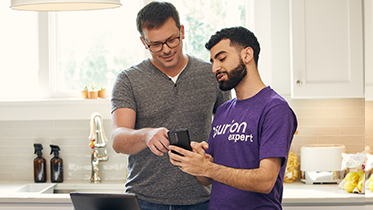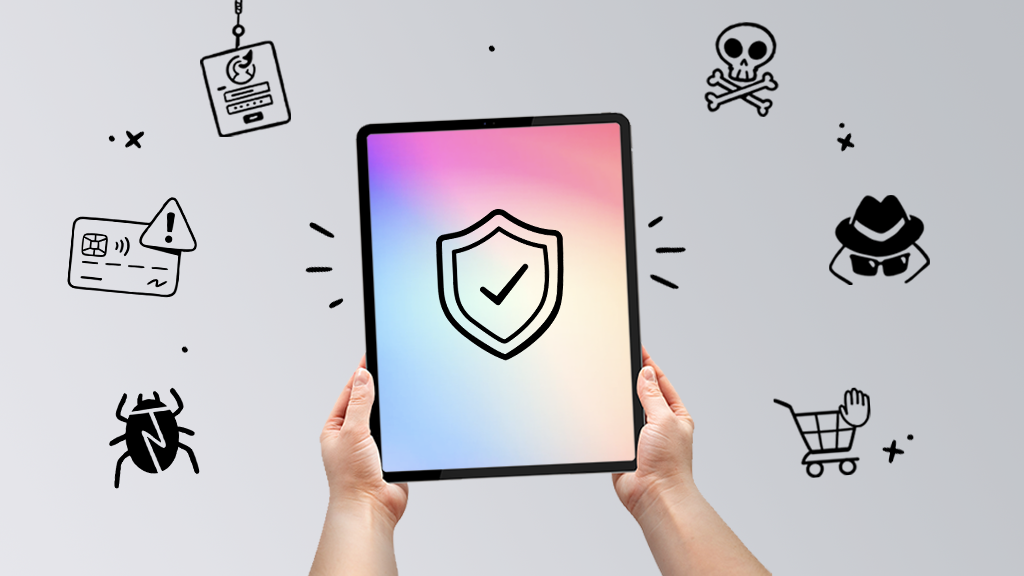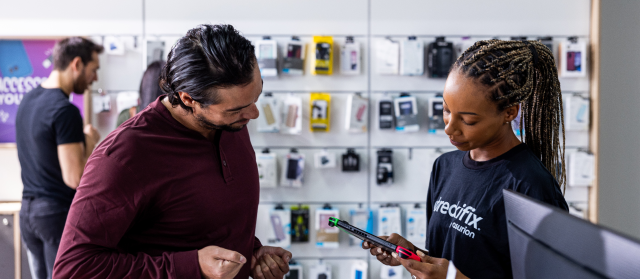Let's imagine you're in a coffee shop, rushing to finish a work memo, when you notice your MacBook® is about to die. You charged it before you got there, but your battery is draining much faster than it used to. Now, all the other power outlets are taken and you're at risk of missing your deadline.
We can't help you meet your deadline, but we can make sure this doesn't happen again. At Asurion, we show you how to get the most out of the tech you love. Here's what to do if your MacBook battery is dying quickly.
Why's my MacBook battery draining so fast?
You may be wondering, how long does a MacBook battery last?
If you take good care of your laptop, it should last for 1000 charging cycles, which translates to about 5 years.
On a single charge, your MacBook should give you about 10–17 hours of battery life, depending on the model and how you use your device.
If the battery drains more quickly than that—or if it dies faster than it used to—certain apps or functions may be to blame. It's also possible that your battery may simply be wearing down, which happens over time.
Here's how to find out why your battery is draining faster:
Check your battery health
There's an easy way to check the battery health on your MacBook. Just follow these simple steps for your version of MacOS®.
MacOS Ventura 13
- Go to Apple menu > System Settings, then click Battery in the sidebar.
- Look at Battery Health on the right and check the status: Normal (battery is fine), or Service recommended (consider replacing the battery soon).
MacOS Monterey 12
- Go to Apple menu > System Preferences, click Battery, then click Battery again.
- In the lower-right corner, click Battery Health and check the status: Normal (battery is fine), or Service recommended (consider replacing the battery soon).
If you get the latter message, reach out to a MacBook repair expert for help.

Don't let a dead battery slow you down
Schedule a device battery replacement or repair at one of our stores to fix it fast.
Check your battery usage
Apps like Zoom® or Spotify® and accessories like high-performance graphics cards are energy hogs, and they often cause your battery to drain. Here's how to find the culprits:
- In the Activity Monitor app on your Mac®, click Energy.
- Check the stats next to each app to see how much energy it's using.
How to make your MacBook battery last longer
Let's take a look at a few simple ways to extend your MacBook battery life.
Adjust the brightness of your screen and screensaver
Your MacBook battery will last longer if you lower your screen's overall brightness. Press the key with the sun logo to decrease brightness and conserve battery power.
If the image on your screensaver or desktop background is particularly bright, you'll save battery power by switching to a darker one.
Reduce energy use
Try one or more of the following features to save battery power:
Use Low Power Mode
MacOS Ventura 13
- Go to Apple menu > System Settings, then click Battery in the sidebar.
- On the Low Power Mode bar, click the arrow to choose between Always, Only on Battery, or Only on Power Adapter to select when to use Low Power Mode.
MacOS Monterey 12
- Go to Apple menu > System Preferences.
- Click Battery or Power Adapter, then select Low Power Mode.
Turn on the Optimized Battery Charging feature
MacOS Ventura 13
- Go to Apple menu > System Settings, then click Battery in the sidebar.
- Click the Info (i) button on the right side of the Battery Health bar.
- On the pop-up, turn on Optimized Battery Charging.
MacOS Monterey 12
- Go to Apple menu > System Preferences.
- Click Battery, then click Battery again in the sidebar.
- Select Optimized battery charging.
Give your hard drive a break when you're not using it
MacOS Ventura 13
- Go to Apple menu > System Settings, then click Lock Screen in the sidebar.
- Click the menu next to Turn display off on battery when inactive on the right, then choose the number of minutes your screen will stay on before going to sleep.
MacOS Monterey 12
- Go to Apple menu > System Preferences, then click Battery.
- Drag the Turn off display after slider to choose the amount of time that needs to pass for your computer to go to sleep automatically.
Disconnect your accessories
Unplug any accessories, like an external hard drive or keyboard, when you're not using them to save battery power.
Quit apps
Apps you're not using may still be working in the background and draining your battery. Close them to save power.
Unplug your laptop
It may sound odd, but keeping your MacBook connected to power will weaken your battery over time. Keeping your device's battery at about 50% to 80% is the ideal range for long-term battery health.
Check for software updates
Outdated software can cause issues with your battery, so always keep your MacBook operating system up to date.
Open System Preferences, then select Software Update. If there's an available update, click Update Now.
If you've tried these steps and still need a little help, we're right around the corner. Schedule a repair at the nearest uBreakiFix® by Asurion store and our certified experts can get your device back up and running as soon as the same day.
Frequently Asked Questions (FAQs)
How long should the MacBook battery last on a full charge?
Your battery will last up to 17 hours on a single charge, depending on the model and how you're using your device.
Why's my MacBook battery draining quickly after a recent software update?
It's possible some apps or processes you are using were set to prevent Sleep Mode after the update. To check, open the Activity Monitor by going to Applications > Utilities and turn on Sleep Mode.
Do apps drain battery power?
Many apps use a great deal of battery power, so make sure to close any you're not using.
Can a faulty charger affect MacBook battery performance?
Yes. When you plug in your laptop, make sure to use the charger that came with your device. Other chargers may be cheaper, but they don't always work as well and can even damage your battery.
If you're worried that your MacBook may have a swollen battery, check out our guide to how to deal with it.





